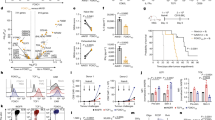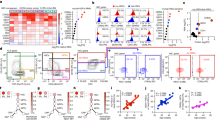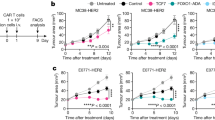Abstract
An adequate response of the innate immune system after allo-SCT is crucial for the clinical outcome of patients submitted to this procedure. EP300 is one of the key genes of the innate immune system (IIS). We evaluated the influence of gene variant A>G rs20551 in EP300 in donor and/or recipient on clinical results after HLA-identical sibling allo-SCT. Patients with AA gene variant had a lower relapse incidence (31 vs 48%, P=0.025; odds ratio (OR)=1.6, P=0.05), attained better disease-free survival (AA: 53% vs AG+GG: 24%, P=0.001; OR=1.8, P=0.01), and better OS (AA: 53% vs AG+GG: 34%, P=0.001; OR=1.9, P=0.007). This beneficial association was more evident when AA gene variant was present in both donor and patient. In healthy individuals, AA gene variant was associated with lower IL2 production after a mitogenic stimuli, higher CD4+ cell response after CMV infection, and higher expression of innate immune genes (IRF-3 and MIF), cell cycle genes (AURKB, CCNA2 and CCNB1), lymphocyte survival genes (NFAT5 and SLC38A2), and with a lower expression of P53 compared with recessive GG gene variant. These findings suggest a beneficial effect of the AA gene variant in rs20551 on clinical outcome after allo-SCT.
This is a preview of subscription content, access via your institution
Access options
Subscribe to this journal
Receive 12 print issues and online access
$259.00 per year
only $21.58 per issue
Buy this article
- Purchase on Springer Link
- Instant access to full article PDF
Prices may be subject to local taxes which are calculated during checkout



Similar content being viewed by others
References
Gooley TA, Chien JW, Pergam SA, Hingorani S, Sorror ML, Boeckh M et al. Reduced mortality after allogeneic hematopoietic-cell transplantation. N Engl J Med 2010; 363: 2091–2101.
Martín-Antonio B, Granell M, Urbano-Ispizua A . Genomic polymorphisms of the innate immune system and allogeneic stem cell transplantation. Expert Rev Hematol 2010; 3: 411–427.
Cavet J, Dickinson AM, Norden J, Taylor PR, Jackson GH, Middleton PG . Interferon-gamma and interleukin-6 gene polymorphisms associate with graft-versus-host disease in HLA-matched sibling bone marrow transplantation. Blood 2001; 98: 1594–1600.
Cullup H, Dickinson AM, Cavet J, Jackson GH, Middleton PG . Polymorphisms of interleukin-1alpha constitute independent risk factors for chronic graft-versus-host disease after allogeneic bone marrow transplantation. Br J Haematol 2003; 122: 78–787.
Granell M, Urbano-Ispizua A, Pons A, Aróstegui JI, Gel B, Navarro A et al. Common variants in NLRP2 and NLRP3 genes are strong prognostic factors for the outcome of HLA-identical sibling allogeneic stem cell transplantation. Blood 2008; 15: 4337–4342.
Holler E, Rogler G, Brenmoehl J, Hahn J, Herfarth H, Greinix H et al. Prognostic significance of NOD2/CARD15 variants in HLA-identical sibling hematopoietic stem cell transplantation: effect on long-term outcome is confirmed in 2 independent cohorts and may be modulated by the type of gastrointestinal decontamination. Blood 2006; 107: 89–93.
Granell M, Urbano-Ispizua A, Aróstegui JI, Fernández-Avilés F, Martínez C, Rovira M et al. Effect of NOD2/CARD15 variants in T-cell depleted allogeneic stem cell transplantation. Haematologica 2006; 91: 1372–1376.
Granell M, Urbano-Ispizua A, Suarez B, Rovira M, Fernández-Avilés F, Martínez C et al. Mannan-binding lectin pathway deficiencies and invasive fungal infections following allogeneic stem cell transplantation. Exp Hematol 2006; 34: 1435–1441.
Kesh S, Mensah NY, Peterlongo P, Jaffe D, Hsu K, VAN DEN Brink M et al. TLR1 and TLR6 polymorphisms are associated with susceptibility to invasive aspergillosis after allogeneic stem cell transplantation. Ann N Y Acad Sci 2005; 1062: 95–103.
Nieters A, Beckmann L, Deeg E, Becker N . Gene polymorphisms in toll-like receptors, interleukin-10 and interleukin-10 receptor and lymphoma risk. Genes Immun 2006; 7: 615–622.
Bochud PY, Chien JW, Marr KA, Leisenring WM, Upton A, Janer M et al. Toll-like receptor 4 polymorphisms and aspergillosis in stem-cell transplantation. N Engl J Med 2008; 359: 1766–1777.
Elmaagacli AH, Koldehoff M, Hindahl H, Steckel NK, Trenschel R, Peceny R et al. Mutations in innate immune system NOD2/CARD 15 and TLR-4 (Thr399Ile) genes influence the risk for severe acute graft-versus-host disease in patients who underwent an allogeneic transplantation. Transplantation 2006; 81: 247–254.
Elmaagacli AH, Koldehoff M, Beelen DW . Improved outcome of hematopoietic SCT in patients with homozygous gene variant of Toll-like receptor 9. Bone Marrow Transplant 2009; 44: 295–302.
Hattori H, Matsuzaki A, Suminoe A, Ihara K, Nagatoshi Y, Sakata N et al. Polymorphisms of transforming growth factor-beta1 and transforming growth factor-beta1 type II receptor genes are associated with acute graft-versus-host disease in children with HLA-matched sibling bone marrow transplantation. Bone Marrow Transplant 2002; 30: 665–671.
Chang YY, Greinix HT, Dickinson AM, Wolff D, Jackson GH, Andreesen R et al. G to C transition at position 173 of MIF gene of the recipient is associated with reduced relapse rates after allogeneic stem cell transplantation. Cytokine 2009; 48: 218–225.
Sandberg ML, Sutton SE, Pletcher MT, Wiltshire T, Tarantino LM, Hogenesch JB et al. c-Myb and p300 regulate hematopoietic stem cell proliferation and differentiation. Dev Cell 2005; 8: 153–166.
Weaver BK, Kumar KP, Reich NC . Interferon regulatory factor 3 and CREB-binding protein/p300 are subunits of double-stranded RNA-activated transcription factor DRAF1. Mol Cell Biol 1998; 18: 1359–1368.
Martín-Antonio B, Carmona M, Falantes J, Gil E, Baez A, Suarez M et al. Impact of constitutional polymorphisms in VCAM1 and CD44 on CD34+ cell collection yield after G-CSF administration in healthy donors. Haematologica 2010 Ahead of print.
http://www.R-project.org. R: A language and environment for statistical computing. In: Computing. RFfS, (ed). Vienna, Austria, 2008.
Andersen PK, Klein JP, Rosthøj S . Generalised linear models for correlated pseudo-observations, with applications to multi-state models. Biometrika 2003; 90: 15–27.
Liu X, Wang L, Zhao K, Thompson PR, Hwang Y, Marmorstein R et al. The structural basis of protein acetylation by the p300/CBP transcriptional coactivator. Nature 2008; 451: 846–850.
Gayther SA, Batley SJ, Linger L, Bannister A, Thorpe K, Chin SF et al. Mutations truncating the EP300 acetylase in human cancers. Nat Genet 2000; 24: 300–303.
Roelfsema JH, White SJ, Ariyürek Y, Bartholdi D, Niedrist D, Papadia F et al. Genetic heterogeneity in Rubinstein-Taybi syndrome: mutations in both the CBP and EP300 genes cause disease. Am J Hum Genet 2005; 76: 572–580.
Pasqualucci L, Dominguez-Sola D, Chiarenza A, Fabbri G, Grunn A, Trifonov V et al. Inactivating mutations of acetyltransferase genes in B-cell lymphoma. Nature 2011; 471: 189–195.
Piwkham D, Gelfond JA, Rerkamnuaychoke B, Pakakasama S, Rebel VI, Pollock BH et al. Multilocus association of genetic variants in MLL, CREBBP, EP300, and TOP2A with childhood acute lymphoblastic leukemia in Hispanics from Texas. Cancer Epidemiol Biomarkers Prev 2011; 20: 1204–1212.
Mateo F, Vidal-Laliena M, Pujol MJ, Bachs O . Acetylation of cyclin A: a new cell cycle regulatory mechanism. Biochem Soc Trans 2010; 38 (Pt 1): 83–86.
Lin CH, Hare BJ, Wagner G, Harrison SC, Maniatis T, Fraenkel E . A small domain of CBP/p300 binds diverse proteins: solution structure and functional studies. Mol Cell Biol 2001; 8: 581–590.
Acknowledgements
This work has been supported by project PI08/1137 from ISCIII (Instituto de Salud Carlos III), project RD06/0020/0012 from RTICC (Red Temática de Investigación Cooperativa en Cáncer) and project PI0079 from Consejería de Salud, Junta de Andalucía. We thank Bernat Gel for all the statistical advice.
Author contributions: AU and BM designed the study; AU obtained funding; JF, IE, MS, MR, FFA, CM, FM and RC obtained clinical data; BM, IA and AB obtained genetic data; BM performed the statistical analysis; AU and BM drafted the manuscript.
Author information
Authors and Affiliations
Corresponding author
Ethics declarations
Competing interests
The authors declare no conflict of interest.
Additional information
This work has been supported by project PI08/1137 from ISCIII (Instituto de Salud Carlos III), project RD06/0020/0012 from RTICC (Red Temática de Investigación Cooperativa en Cáncer) and project PI0079 from Consejería de Salud, Junta de Andalucía.
Supplementary Information accompanies the paper on Bone Marrow Transplantation website
Supplementary information
Rights and permissions
About this article
Cite this article
Martín-Antonio, B., Álvarez-Laderas, I., Cardesa, R. et al. A constitutional variant in the transcription factor EP300 strongly influences the clinical outcome of patients submitted to allo-SCT. Bone Marrow Transplant 47, 1206–1211 (2012). https://doi.org/10.1038/bmt.2011.253
Received:
Revised:
Accepted:
Published:
Issue Date:
DOI: https://doi.org/10.1038/bmt.2011.253
Keywords
This article is cited by
-
EP300 single nucleotide polymorphism rs20551 correlates with prolonged overall survival in diffuse large B cell lymphoma patients treated with R-CHOP
Cancer Cell International (2017)
-
A variant in IRF3 impacts on the clinical outcome of AML patients submitted to Allo-SCT
Bone Marrow Transplantation (2013)



